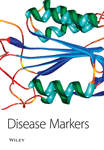Virological, Immune and Host genetics Markers in the Control of HIV Infection
Abstract
HIV infection, if left untreated, leads in most cases to the development of wide immune deterioration, opportunistic infections and eventually AIDS and death. The identification of individuals who despite persisting infection show no or few signs of HIV disease progression has spurred hopes that an effective HIV vaccine could be attainable. The design of such a vaccine will greatly depend on the precise definition of disease markers, host genetic and immune characteristics that mediate relative in vivo control of this virus. Accordingly, a number of viral factors and host genetic characteristics have been shown to play a crucial role in the control of HIV disease by delaying progression to AIDS or even preventing infection. There is also an improved understanding of humoral and cellular immune responses in terms of specificity, functional repertoire, longevity and tissue distribution and their ability to contain HIV replication. However, the definition of good immune correlates unequivocally and causally associated with protection or disease progression remains elusive. Here we review work on viral factors, host genetic markers and immunological determinants that have been identified in individuals with superior control of HIV infection or in subjects who remain uninfected despite frequent exposure to the viral pathogen.




